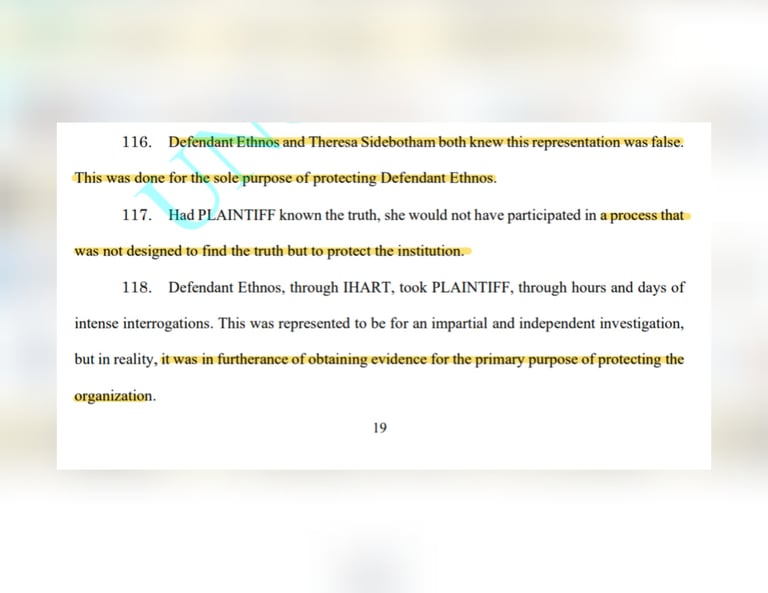April 2025 complaint and IHART
IHARTABUSEINVESTIGATIONLAWSUITTHERESA SIDEBOTHAM/TELIOS LAW
5/8/20253 min read


A significant portion of the April 2025 complaint against Ethnos360 describes allegations relating to IHART. The IHART-specific allegations begin by explaining how Ethnos360 leads its members to believe that IHART is independent. The complaint alleges IHART was never outside or independent but rather was formed by Ethnos360/New Tribes Mission and supervised by a law firm they hired, which answers to Ethnos360 leadership. It also points out that IHART is a trademark owned by Ethnos360. The complaint alleges that Telios Law, IHART coordinator Theresa Sidebotham's law firm, has a long history of working for Ethnos360. It then describes how Theresa Sidebotham directed the investigations, had ultimate investigative decision-making, and that IHART then made recommendations to an Ethnos360 committee, which ultimately made decisions about policies, changes, or actions.
The complaint goes on to lay out a series of three interviews of the plaintiff conducted by IHART. The first interview is described as three hours long. It alleges the plaintiff requested the ability to write things out that were particularly hard to speak about and was denied. It goes on to allege the IHART representatives didn't seem to have experience with trauma-informed interviews and describes one of the investigators telling the plaintiff it would be good if her memories were false and she could "move on and not focus on it." It then alleges that, after some time, the plaintiff was told she would need another interview due to what seems like their own failure to appoint the right team to her case.
The second interview is alleged to have lasted four and a half hours and to have been conducted by representatives who lacked experience and knowledge. After the second interview, the complaint alleges the plaintiff did not hear much from IHART for a year and a half. Another allegation made is that neither IHART nor Theresa Sidebotham seems to have contacted law enforcement or child protective services about this credible report that a United States citizen, Nate Horling, abused a child.
The third interview is described as rehashing the same allegations with clarifying questions. The complaint outlines plaintiff's alleged conversation with an IHART representative regarding whether the crimes alleged would be reported to law enforcement, to which the representative allegedly responded, "The stories you shared happened in Indonesia, so there would be no need for us to report it to the police here," while another investigator added, "The U.S. law enforcement doesn't care. The U.S. police don't have jurisdiction, so we have to fill in that gap." The total time spent on interviews, according to the complaint, was nine hours.
The complaint says months later the plaintiff received the statement of findings, which allegedly did not identify the alleged perpetrator by name; did not lay out the scope or methodology of the investigation; made material misstatements and omissions, failing to accurately describe the information plaintiff had shared during hours of interviews; and concluded they couldn't determine the abuse occurred. It also alleges that the requirement for corroboration was a witness or the perpetrator's confession. Contrary to what Ethnos360's lawyer's statement to the media seems to imply, the complaint alleges Ethnos360 never provided the plaintiff with counseling or professional services. Upon completion of the IHART report, the complaint alleges that Ethnos360 never reported any of the disclosures of abuse to law enforcement or a child protection agency, despite mandatory reporting laws.
In summary, based on the totality of the allegations related to IHART, the complaint alleges that the purpose of the IHART investigation was not to find the truth or hold the alleged perpetrator accountable and protect children, but rather for the sole purpose of protecting the institution, Ethnos360.
